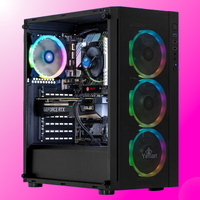AMD's greatest gaming CPU won't be beaten by AMD's latest gaming CPU, and that's according to AMD
But upcoming X3D versions of Ryzen 9000-series chips will be even better.

We touched on AMD's plans for future CPUs with 3D V-cache based on its latest Zen 5 CPUs, otherwise known as the Ryzen 9000 series, last week. But it's interesting to note that AMD itself says that its existing Ryzen 7000 X3D chips with 3D V-cache will remain the fastest gaming CPUs around, even with the arrival of Zen 5 technology.
Speaking to Tom's Hardware, AMD's Senior Technical Marketing Manager of Consumer Processors Donny Woligroski confirmed that Ryzen 9000 will not quite knock the Ryzen 7 7800X3D off its gaming perch. When asked if the hot new Ryzen 9000 CPUs would be the fastest gaming CPUs yet, he had this to say:
"Is it the fastest in gaming? It's faster than the competition in our tests. X3D is still the king of the hill, but by a much smaller margin than typically between X3D and non-X3D. So a 7800X3D would, yes, be faster than 9700X, but maybe not by as much as you would expect."
You might think that's surprising. After all, the new Zen 5 architecture delivers a 16% increase in IPC according to AMD. But that's an average figure, not a flat 16% with all software in all situations.
Moreover, this is not unprecedented. When AMD rolled out its then-new Ryzen 7000 CPUs a couple of years ago, the old Ryzen 7 5800X3D likewise retained its gaming crown until the 7800X3D came along with its own V-cache-accelerated gaming gumption.
That's because extra cache memory can make a particularly big difference in games. Indeed, in some titles, the 7800X3D can be over 35% faster than its closest non-X3D sibling, the 7700X. Admittedly, that's a best case scenario. But many games are boosted by around 20% or more and you're usually looking at a minimum improvement, where the CPU is the bottleneck, of about 15%.
In that context, it's not a huge surprise that even the new Zen 5 architecture isn't enough to see off that tasty V-cache gaming boost. As for what to expect from the Ryzen 9000 with 3D V-cache, we explained last week that AMD isn't providing any details other than say that it's working to make it "even better".
The biggest gaming news, reviews and hardware deals
Keep up to date with the most important stories and the best deals, as picked by the PC Gamer team.
A few things we might hope for is even more cache and perhaps making the cache chips a little thinner. The latter would help with thermals, which in turn could mean that the 3D V-cache variants run with a lesser clockspeed deficit to their conventional siblings than we've previously seen. Or perhaps no deficit at all.
All we can say for sure is that if Zen 5's gaming performance responds to 3D V-cache at least as well as previous AMD CPU architectures, then the Ryzen 7 9800X3D, as we assume it will be known, is going to be an absolute gaming monster.
Best gaming PC: The top pre-built machines.
Best gaming laptop: Great devices for mobile gaming.

Jeremy has been writing about technology and PCs since the 90nm Netburst era (Google it!) and enjoys nothing more than a serious dissertation on the finer points of monitor input lag and overshoot followed by a forensic examination of advanced lithography. Or maybe he just likes machines that go “ping!” He also has a thing for tennis and cars.
Most Popular







